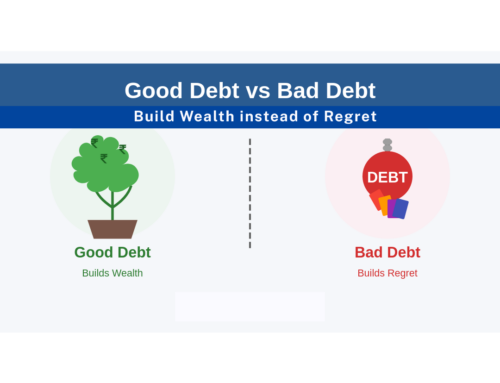In today’s fast-paced world, financial security and long-term wealth creation are every family’s goal. But the question is—how do you make your money work for you? The answer lies in two powerful tools: Systematic Investment Plans (SIP) and Mutual Funds.
As a SEBI-registered Mutual Fund Distributor, I’ve seen firsthand how Indian families—both salaried and self-employed—can achieve their dreams by building wealth slowly, steadily, and strategically. Let’s dive into how SIPs and mutual funds can help your family live a life free from financial stress.
What is a SIP?
A Systematic Investment Plan (SIP) allows you to invest a fixed amount in mutual funds at regular intervals—monthly, quarterly, etc. Instead of timing the market, SIPs help you stay consistent, disciplined, and benefit from rupee cost averaging and compounding.
Benefits of SIPs in Wealth Creation
1. Start Small, Dream Big
You can start investing with as little as ₹500 per month. Over the years, this can grow into a substantial corpus for your child’s education, retirement, or home loan prepayment.
2. Power of Compounding
When you start early and stay invested, the compounding effect multiplies your money exponentially over time. This is the foundation of long-term wealth.
3. Emotional Discipline
SIPs automate your investments—no more worrying about market ups and downs. This encourages a long-term view and prevents emotional decision-making.
4. Achieve Multiple Family Goals
Create separate SIPs for:
- Children’s education
- Retirement
- Emergency fund
- Dream home or vacation
Why Mutual Funds Are Ideal for Indian Families
Mutual funds pool money from investors and are managed by expert fund managers. They are:
- Diversified (reduce risk)
- Regulated by SEBI
- Available for all risk appetites (conservative to aggressive)
- Transparent with easy access to track performance
Whether you are planning a secure future or looking for tax-saving investments under Section 80C (like ELSS), mutual funds offer flexibility + returns.
Real-Life Example: SIP for a Secure Family Future
Let’s say you invest ₹5,000/month in an equity mutual fund through SIP for 15 years. Assuming a 12% annual return:
✅ Total Invested: ₹9 Lakhs
✅ Future Value: ₹22.9 Lakhs approx.
That’s 2.5X growth—just by staying consistent!
Now imagine if both husband and wife invest ₹5,000/month each. Your family’s total corpus can touch nearly ₹46 Lakhs in 15 years!
SIPs and mutual funds are not just investments—they are tools to secure your family’s dreams, one step at a time. The earlier you start, the bigger your wealth grows. Start today and give your family a financial cushion for life.
Want to Start SIPs but Don’t Know Where to Begin?
I help families like yours make smart, goal-based investment plans through mutual funds. If you’re in Jaipur, you can:
Book a Free Consultation
Get a Customized Investment Plan
Learn how to start SIPs easily & safely
➡️ Visit My Office
📞 Call Now: 9981998013
📍 Location: 710 ,Mall of Jaipur, Gandhi Path, Vaishali Nagar, Jaipur – 302021 (Rajasthan)
Ready to build long-term wealth for your family?
Call Gunjan Kataria, SEBI Registered Mutual Fund Distributor in Jaipur
✅ Goal-Based Planning | ✅ SIP Setup | ✅ Lifetime Support
Frequently Asked Questions (FAQs)
1. What is the best way to start a SIP for my family?
The best way is to consult a SEBI-registered mutual fund distributor who can understand your family’s goals and risk profile. You can start SIPs online or offline with minimal documentation and as little as ₹500/month.
2. How much should I invest in SIP every month?
It depends on your goals, income, and timeframe. Ideally, allocate at least 20% of your monthly income toward long-term investments. Start small and increase your SIPs annually.
3. Is SIP safe for long-term wealth building?
Yes. SIPs in mutual funds are regulated by SEBI and offer diversification. While market-linked, they smooth out risks over time through rupee cost averaging and compounding.
4. How long should I continue a SIP for maximum benefit?
The longer you stay invested, the more wealth you build. A minimum of 5-10 years is recommended for significant compounding effects and to ride out market volatility.
5. Can SIPs help in saving tax?
Yes. SIPs in ELSS (Equity Linked Saving Schemes) offer tax deductions under Section 80C of the Income Tax Act, up to ₹1.5 lakhs per year, with a lock-in period of 3 years.
6. What are the benefits of starting SIPs for children’s future?
SIPs help you build a dedicated education or marriage fund for your child over 10-15 years. You can create a separate goal-based SIP portfolio to track and grow this fund with ease.
7. How can mutual funds help me beat inflation?
Equity mutual funds have historically delivered higher returns than traditional savings instruments. Over the long term, they help your wealth grow faster than inflation, preserving purchasing power.
8. Can I pause or stop my SIPs anytime?
Yes. SIPs are flexible. You can increase, pause, or stop your investments at any time without penalties. However, staying consistent yields the best results.
9. Is KYC mandatory for investing in SIPs or mutual funds?
Yes. Completing your KYC (Know Your Customer) process is mandatory to start SIPs or invest in any mutual fund scheme. It’s a one-time, simple procedure.
10. How can I monitor my SIP and mutual fund performance?
You can track your investments through your mutual fund distributor, online portals, or apps. Regular portfolio reviews with your advisor, Financial Friend, ensure your plan stays on track.





